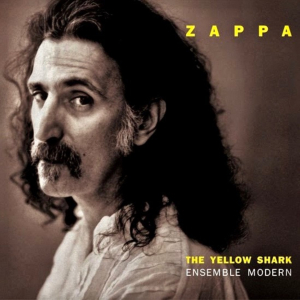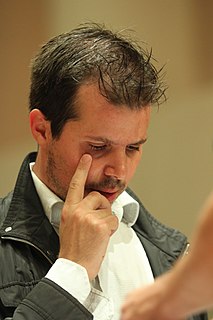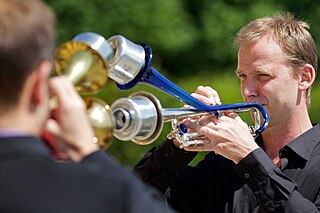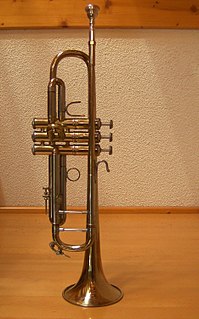Post-communist performances
In 1990, after the border opening, the ensemble gave its first concert in the presence of Stockhausen. He wrote afterwards in a letter:
...it was good that I finally heard you in a concert. I would like to thank you all: you kept the intuitive music alive. We will surely go on together to develop this unfamiliar music form.
In 2005 the collaboration with Stockhausen resulted in studio recordings of six intuitive compositions from his cycle Für kommende Zeiten under his direction for his CD label.
Since the early 1990s EFIM has worked on projects in collaboration with artists of other disciplines. One of the ensemble's most ambitious creations was "Flame Sound Meiningen" (1996) for 16 hot-air balloon burners, dancers, choir, ensemble, and tape by Hans Tutschku. This performance, which featured various configurations of 18-feet-high flames, took place in the English Garden of the city of Meiningen.
Also in 1996, EFIM collaborated with the choreographer Joachim Schloemer for the festival Kunstfest Weimar. "Imaginary Areas" was created for 4 dancers, ensemble and multi-dimensional sound projection, controlled by touch-sensitive dance floor sensors. In 1998 the ensemble worked with DJ Juryman (London) in the project "Disco as Art Space." In 1999, when Weimar was proclaimed a European Culture City, the EFIM traveled with the project "The Church as Sound Sculpture" (concerts and sound installations by Hans Tutschku) to Paris, Basel and Plovdiv. In collaboration with Christine Kono (Japan/USA), Dimitri Kraniotis (Greece/France), and David Kern (USA/Germany), the ensemble's 2003 project "Sacred Dances" was the centerpiece of the Culture Arena Jena in the Friedens Church.
The group has also taken part in Expo 2000 in Hanover, in the festivals in Porto (2001), Warsaw (2002), Rome (2003), Vienna (2004), Boston and New York City (2006).

The Yellow Shark is an album of orchestral music by American musician Frank Zappa. Released in November 1993, it was the last Zappa album to appear in his lifetime, almost exactly a month before he died of the cancer from which he had suffered for several years. It features live recordings from the Ensemble Modern's 1992 performances of Zappa's compositions. In the album's notes, Zappa describes The Yellow Shark as one of the most fulfilling projects of his career, and as the best representation of his orchestral works.
Kontra-Punkte is a composition for ten instruments by Karlheinz Stockhausen which resolves contrasts among six instrumental timbres, as well as extremes of note values and dynamic levels, into a homogeneous ending texture. Stockhausen described it: "Counter-Points: a series of the most concealed and also the most conspicuous transformations and renewals—with no predictable end. The same thing is never heard twice. Yet there is a distinct feeling of never falling out of an unmistakable construction of the utmost homogeneity. An underlying force that holds things together—related proportions: a structure. Not the same Gestalten in a changing light. But rather this: various Gestalten in the same light, that permeates everything".

James Lloyd Morrison AM is an Australian jazz musician. Although his main instrument is trumpet, he has also performed on trombone, tuba, euphonium, flugelhorn, saxophone, clarinet, double bass, guitar, and piano. He is a composer, writing jazz charts for ensembles of various sizes and proficiency levels.
Ivan Božičević is a Croatian composer, pianist, organist and jazz musician.
Hans Tutschku is a German composer.

Aus den sieben Tagen is a collection of 15 text compositions by Karlheinz Stockhausen, composed in May 1968, in reaction to a personal crisis, and characterized as "Intuitive music"—music produced primarily from the intuition rather than the intellect of the performer(s). It is Work Number 26 in the composer's catalog of works.
David C. Sampson is an American contemporary classical composer.
Dietmar Bonnen is a German composer and pianist.

Huck Hodge is an American composer of contemporary classical music.

The Ensemble Musikfabrik is an ensemble for contemporary classical music located in Cologne. Their official name is Ensemble Musikfabrik Landesensemble NRW e.V..

Marco Blaauw is a Dutch trumpet soloist known for his work in the field of new music and with Cologne-based contemporary music group Ensemble Musikfabrik. He plays a double bell trumpet, an invention that has allowed for numerous new compositions for trumpet, including those by Ernst von Siemens Music Prize winner, Rebecca Saunders. Blaauw is a consistent faculty member at the Darmstadt Summer Course, the Stockhausen Courses Kürten, the Lucerne Festival, and the Chosen Vale International Trumpet Seminar.

The trumpet repertoire consists of solo literature and orchestral or, more commonly, band parts written for the trumpet. Tracings its origins to 1500 BC, the trumpet is a musical instrument with the highest register in the brass family.

Michael Obst is a German composer and pianist.

Samstag aus Licht is an opera by Karlheinz Stockhausen in a greeting and four scenes, and was the second of seven to be composed for the opera cycle Licht: die sieben Tage der Woche. It was written between 1981 and 1983, to a libretto written by the composer and incorporating a text by Saint Francis of Assisi, and was first staged in Milan in 1984.

Dienstag aus Licht is an opera by Karlheinz Stockhausen in a greeting and two acts, with a farewell, and was the fourth of seven to be completed for the opera cycle Licht: Die sieben Tage der Woche. It was begun in 1977 and completed from 1988 to 1991, to a libretto by the composer.
Gerhard Präsent is an Austrian composer, conductor and academic teacher.

Für kommende Zeiten is a collection of seventeen text compositions by Karlheinz Stockhausen, composed between August 1968 and July 1970. It is a successor to the similar collection titled Aus den sieben Tagen, written in 1968. These compositions are characterized as "Intuitive music"—music produced primarily from the intuition rather than the intellect of the performer(s). It is work number 33 in Stockhausen's catalog of works, and the collection is dedicated to the composer's son Markus.
Annesley Black is a Canadian composer.
Péter Kőszeghy is a Hungarian composer and music eductor.
This page is based on this
Wikipedia article Text is available under the
CC BY-SA 4.0 license; additional terms may apply.
Images, videos and audio are available under their respective licenses.









